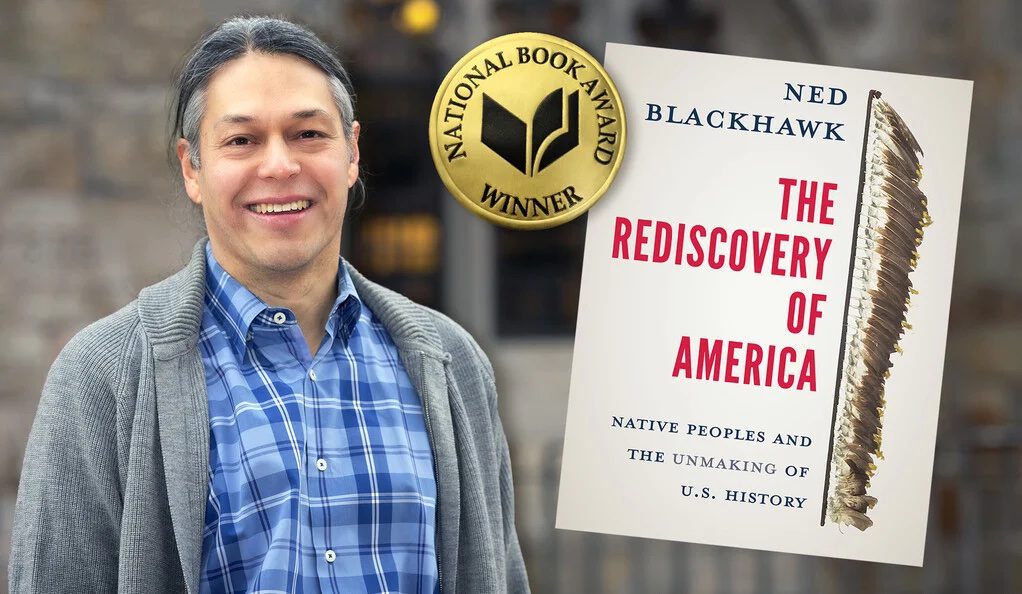Yale historian Ned Blackhawk’s ‘The Rediscovery of America’ wins National Book Award
On Nov. 15, Yale historian Ned Blackhawk (Te-Moak Tribe of Western Shoshone) won the National Book Award in nonfiction for his fourth book, “The Rediscovery of America: Native Peoples And The Unmaking of U.S. History.” In light of this award, Yale faculty across the field of Native and Indigenous studies discussed their reaction to the book’s wide acclaim and what they believe to be the book’s legacy.

Yale News
Yale historian Ned Blackhawk (Te-Moak Tribe of Western Shoshone) won the National Book Award in nonfiction for his fourth book, “The Rediscovery of America: Native Peoples And The Unmaking of U.S. History” on Nov. 15. Published in April by Yale University Press, “The Rediscovery of America” is a reappraisal of the past five centuries of U.S. history that argues for the centrality of Indigenous peoples in the nation’s evolution.
The national bestseller was shortlisted for the nonfiction National Book Award on Oct. 3 and since has been named a New Yorker Best Book of 2023, New York Times Notable Book of 2023 and Washington Post Notable Work of Nonfiction of 2023, along with winning the National Book Award’s nonfiction category.
Other nonfiction finalists for the 2023 National Book Award include Cristina Rivera Garza’s “Liliana’s Invincible Summer: A Sister’s Search for Justice,” Christina Sharpe’s “Ordinary Notes,” Raja Shehadeh’s “We Could Have Been Friends, My Father and I: A Palestinian Memoir” and John Valliant’s “Fire Weather: A True Story from a Hotter World.”
At the award ceremony, Blackhawk began his finalist reading with the question in the introduction of “The Rediscovery of America”: “How can a nation founded on the homelands of dispossessed Indigenous peoples be the world’s most exemplary democracy?” In the reading, Blackhawk noted that he considers this to be the question that “haunts” America, and underscored later in his finalist reading that “it is time to reimagine U.S. history outside the tropes of discovery.”
Several Yale faculty across Native and Indigenous studies told the News that they support Blackhawk’s self-described “reimagining” as a critical intervention in academic understandings of American history. lecturer Stephen Pevar — who currently teaches “Advanced Federal Indian Law: Contemporary Issues” at the Yale Law School — told the News that “The Rediscovery of America” is an “enormous contribution” that “starts the discourse on not only what happened to American Indian tribes, but how these Indigenous peoples in turn influenced United States history.”
Echoing Pevar, Tarren Andrews (Confederated Salish/Kootenai Tribes), an assistant professor of ethnicity, race and migration, said that “The Rediscovery of America” is a text that “changes minds in intellectual strongholds” and a necessary historical critique.
“If you want to have an American national canon, then by that logic, [the national canon] has to be built on the people who were telling stories here first,” Andrews said.
According to the National Congress of American Indians’ 2019 “Becoming Visible” report, only one-third of 28 surveyed states allocated funding for Native American education curricula and less than half of surveyed states required Native American education to be taught in K-12 schools.
Citing this report, Pevar told the News that Blackhawk’s latest project aims to fill a dearth in Native and Indigenous curricula in secondary and higher education. According to Pevar — who has taught federal Indian law for the past two decades at the University of Denver School of Law and the New York University Law School — there has been a growth in foundational federal Indian law courses across law schools in America. He noted, however, that fewer than 10 law schools have advanced federal Indian law courses such as those offered at Yale.
“In the future, I hope law schools can first increase their offerings in federal Indian law, and second, recognize federal Indian law as a part of American law,” Pevar said.
Referencing Pulitzer Prize-winning poet Natalie Diaz’s (Mojave) upcoming advanced creative writing seminar, “Breathing Poetry into the Archives,” taught in the spring semester, and the over-enrollment of her current fall semester courses “Critical Reading Methods in Indigenous Literature” and “Indigenous Thought and Anticolonial Thought,” Andrews believes that “The Rediscovery of America” supports what is also an Indigenous literary movement at the undergraduate level.
“Students who are interested in literature and storytelling more broadly, are showing every day that they’re really committed to learning about Indigenous stories,” Andrews said.
Both Pevar and Andrews told the News that “The Rediscovery of America” not only increases student engagement with Native and Indigenous studies but also supports the Native and Indigenous student community, who see Blackhawk’s academic work as an inspiration for their own coursework.
“Professor Blackhawk, more than anyone I’ve encountered here, is so committed to the student community and the faculty community. He’s so committed to Indigenous representation that more than anything it felt like a win for all of us,” said Andrews.
Blackhawk is also the author of “Violence Over The Land,” which won the Frederick Jackson Turner Award and the John C. Ewers Award, among other accolades.







